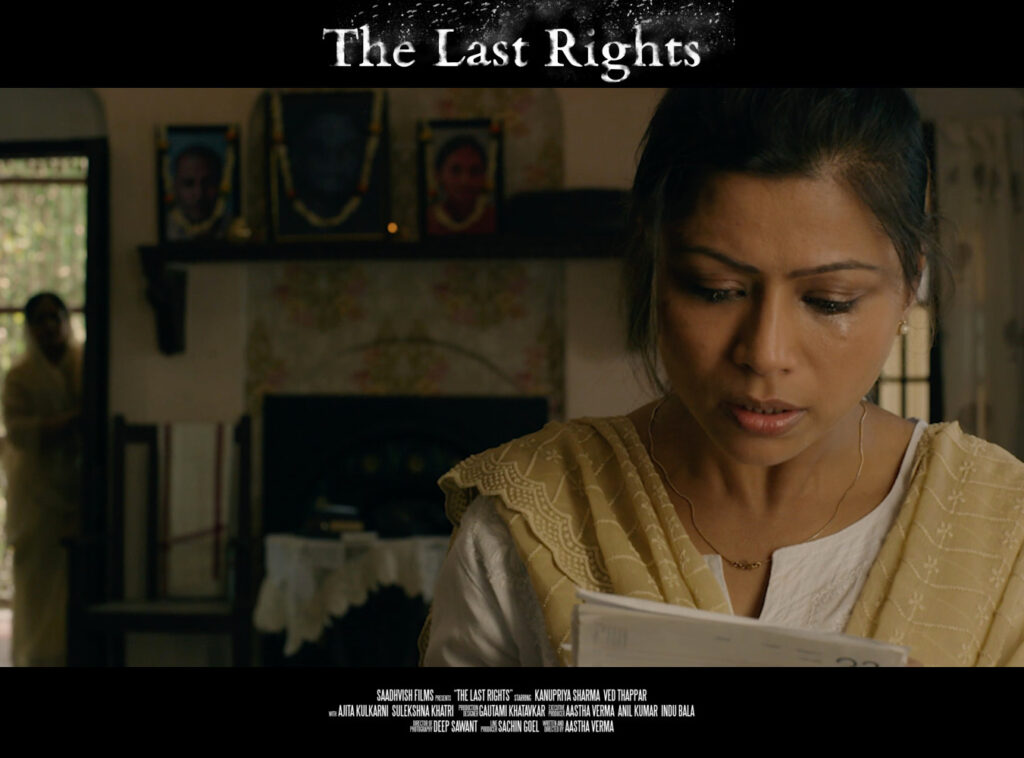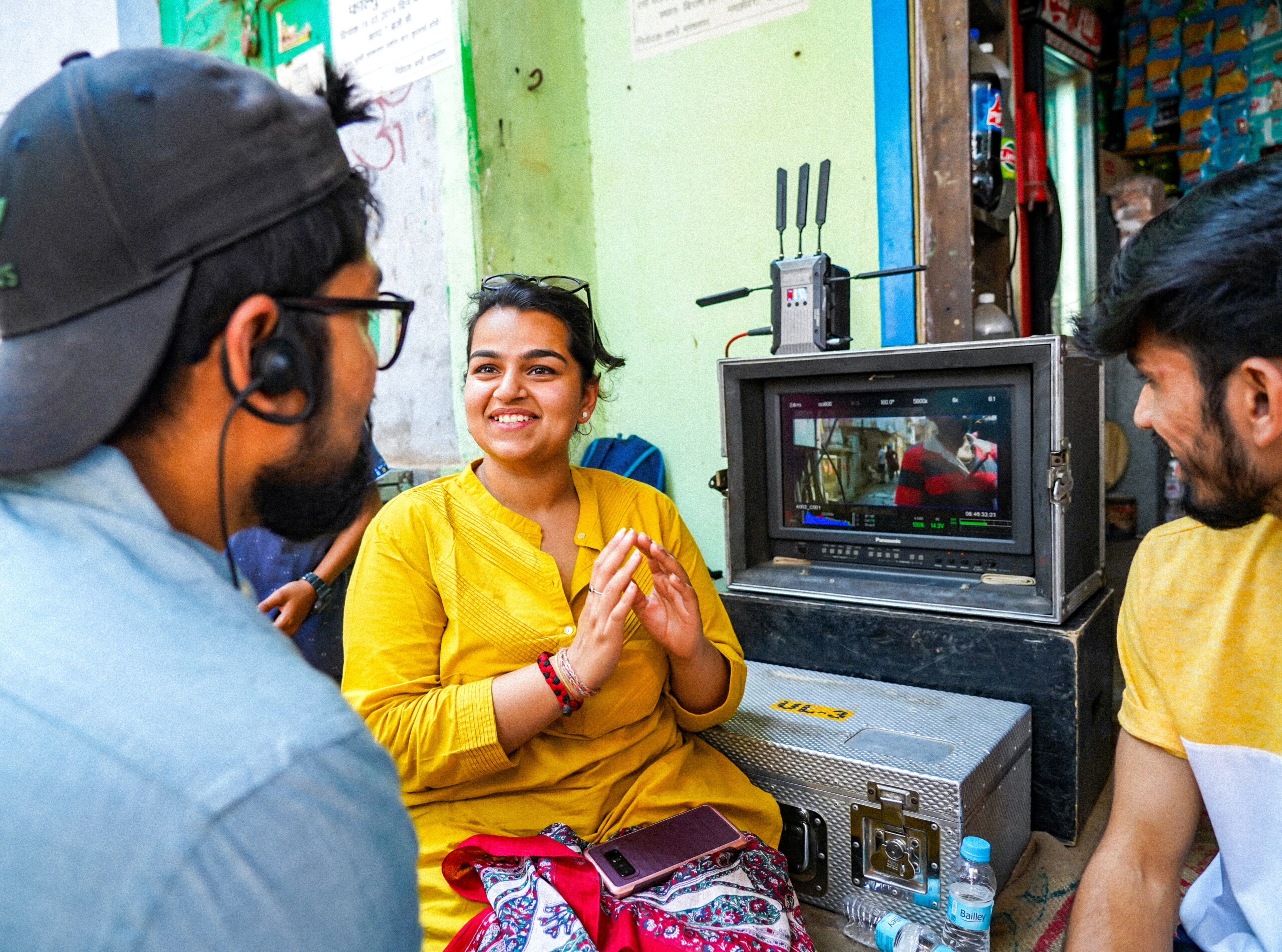“I think that film has the responsibility of promoting change and helping the advancement of society,” says Fall 2017 MFA Filmmaking alum Aastha Verma, and she is certainly doing that with her short thesis film The Last Rights. The story follows a young Indian woman who returns to her hometown of Varanasi, India, and challenges her society’s patriarchal traditions in order to give her deceased grandmother her last rites. Verma explained,“My goal in making this film was to shed light on how women are treated in tradition-driven India as well as how Indians who left to work abroad are perceived by their friends and families back home.”
Beautifully photographed and filled with stunning imagery, The Last Rights premieres at the Topaz Film Festival in Dallas, Texas, where it will be available on demand September 8-13, 2020. Crickett Rumley, NYFA’s Director of Film Festivals, spoke with Aastha about her path to making this film.
Crickett Rumley (CR): Congratulations on such a compelling story, Aastha. Tell us about yourself. What were you doing before you came to NYFA?
Aastha Verma (AV): Before coming to NYFA, I got my bachelor degree in International Business Management. What got me into filmmaking was a number of factors, one of which was that I felt that there was a perspective that was missing of sorts. I did not see any of the films in theatre tackle subjects that I was passionate about. Plus, I used to do photography as a hobby, so at some point I started to wonder what kind of stories would I be able to tell with more than one frame? A combination of both of these factors led me to Los Angeles.
CR: What was your favorite thing about directing this film?
AV: Quite frankly, all of it, the experience as a whole. More specifically, this was my first time directing actors in a professional function. Instead of the regular set you’d have for a thesis film, it was a city in India, with a completely different filmmaking culture which made the whole thing quite thrilling. I had never tackled a project of this scale beforehand, so it was quite a challenge. But this very same challenge motivated me to live up to it.
The production phase was very much a collaborative process with my cast and crew as everybody believed in the project which made it, all in all, a very wholesome experience. I was very grateful for my cast and crew.

CR: What was the most challenging thing about making the film? What did you learn in the process?
AV: The most challenging part of it all was when, during pre-production we took the team to the Shamshan Ghat, the funerary riverbed where the rites are performed. It’s the location where the final scene of the film takes place.
The local priest’s brother essentially snuck us in, acting as a chaperone, as my team and I looked around and took notes about how the location looked. We had originally brought cameras to film the location so we could then study it at home, but they had been confiscated. The reason for such secrecy is that women aren’t allowed to be at the Shamshan Ghat. The production designer and I were the only women there, and all the men there that day (who were not part of the crew) looked at us as if our presence was heresy.
So the challenge was figuring out how to portray an act that I had never been able to even witness firsthand. The very reason we were there was to see how exactly the rites are done, beyond what is simply written in books. There was an irony to it all: I was making a film about this very inequality, yet I wasn’t even allowed to be at the Ghat physically without a chaperone.
Eventually we recreated the scene on a private property bordering another part of the river.
CR: What are you looking forward to with your screening with the Topaz Film Festival?
AV: I’m really excited to meet new people all in the same industry as me. Those conversations will definitely be fun. In fact, there’s an entire panel dedicated to helping the filmmakers meet and interact with each other, and I’m glad to be a part of it.
CR: How do you think your education at NYFA and the work you did here prepared you for a career in filmmaking? Do you have any special shout-outs to faculty or staff who really helped or inspired you?
AV: Well, the way NYFA works is that they expose you to extreme shooting conditions so when we’re actually on set, professionally, we’re mentally prepared for the ropes. I think that’s an efficient way of allowing us to learn the ropes. Plus, the fact that it’s such an international school allowed me to be paired with many filmmakers from different countries and walks of life which helped me find my individuality as an artist.
Special shout-out to Nick Sivakumaran, as well as Scott Hartmann, Kim Ogletree, David Newman, Igor Torgeson and Crickett Rumley for their help with this film, as well as everybody else who taught my course in NYFA!

CR: Since you graduated, you’ve been really busy with music videos. Can you tell us about that?
AV: It was definitely a breakthrough in my career, a level-up of sorts. It was a wonderful experience to be a part of the team and working with a crew composed of both NYFA alumni and other professionals. Diljit Dosanjh is one of India’s most popular up-and-coming singers, so receiving an invitation to work as a producer on all the music videos from his latest album was amazing. The pandemic didn’t stop us head-banging to the tunes on the set!
CR: These are trying times in the world today. Art matters more than ever. Do you want to share any words, your personal views about the importance of film in the lives of humans living right now?
AV: The biggest lesson I am taking away from these times, specifically, is about compassion and patience. Staying at home due to COVID-19 is almost a sort of purgatory, like when your parents put you in a corner. It allows you to reflect on who you are, what your art is.
It also enables compassion, allows you to appreciate those who are there for you, and be there for others, when the chips are down. These are all lessons that movies have taught us throughout history, but that I only found myself truly appreciating in these trying times.
CR: What time is your film screening and where can we get tickets? Is there anything else we should know about the screening?
AV: I’m glad you asked! Up until the 13th, The Last Rights is screening all day, at any time. You can get the tickets here. Please go check it out!
If you want to know more about the process of making this film, I will also be speaking at the ‘Meet the Filmmakers’ panel on Sunday the 13th from 11:00 a.m. to 12:00 p.m. PT. Click here to get your ticket.
Finally, the film is in the running for Topaz’s Audience Award! If you like the film, please don’t forget to vote for it. To vote, it’s easy: once you’re logged in on the virtual catalog (or at the content library, watch.eventive.org/me), all you need to do is go the screening page, select The Last Rights from the sidebar, and a ballot will appear below the “cover image” in the center of the screen.